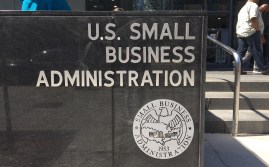
When Joseph Jordan walked into the White House this morning to start his new job as Senior Advisor to Office of Management and Budget Deputy Director for Management Jeff Zients, he didn’t know things like the location of his desk, email address or annual salary.
But the former Associate Administrator at the Small Business Administration who, for the past three years, has worked diligently to push government contracting funds to small businesses through the various set-aside programs did know some important facts: that he’d be able to continue to help small businesses grow and create jobs to provide the government with the innovative solutions of the future.
FedScoop sat down with Jordan last week in his last interview as an SBA employee, where he looked back at his success since entering public service from McKinsey and Company in March of 2009.
“I’m really proud of what the team has done here the last few years,” Jordan said. “I’ve never worked so hard at any job in my life, but it’s been totally worth it.”
When Jordan came to the agency, it had seen small business contracting drop the previous three years, falling short of the targeted 23%. In the 24 months following? The largest two-year increase in over a decade thanks to the mobilization of several initiatives aimed at streamlining the processes the government uses with small businesses to award contracts.
For instance, Jordan’s team implemented a set-aside for women-owned small businesses; something that Congress had passed into law a decade ago, but was never enacted. Jordan and his team also looked at the 8(a) program – an integral program that awards contracts to small business contractors – to make changes to the program, but in a collaborative way.
“In any changes we made, it was never without working with the community to find out exactly what’s working, what’s not, and to find the best solutions,” Jordan said. “It was never about government coming in and telling people how to operate, but really listening to the ways that we could best help facilitate what they do.”
Another big effort has been around eliminating fraud, waste and abuse to the HUBZone set-aside program aimed at helping companies located in historically economically disadvantaged areas.
Jordan tells the story of two weeks after taking the job going to Capitol Hill to testify on the subject with his predecessor Darryl Hairston. The Government Accountability Office had recently said that one of the best ways to prevent HUBZone fraud waste and abuse was on-site visits from SBA, but the agency had only done seven in the previous six months (and that’s with 10,000 companies in the program).
“It’s never fun to go on Capitol Hill, but that was burned into my mind,” Jordan jokes now.
He did take the feedback to heart. In the following seven months after that testimony, the SBA did 700 HUBZone visits and has done more than 1,000 in each of the past two years.
And it’s not just about doing the visits, but doing them smarter, looking for trends in companies that typically abuse the program and looking for patterns to give the site visits more power.
Lately, Jordan has been focused on the Small Business Jobs Act of 2010 and implementing the 19 provisions within them that dealt with government contracting, most notably the Quick Pay system that looks to get small business contractors paid in 15 days during the contract instead of the typical 30 days – a key component for small businesses in keeping a healthy cash flow.
“This job has been great, because its not just about helping one company’s bottom line – something I think is fun, but is unsustainable – but being able to help thousands of small businesses,” Jordan said. “I wouldn’t have left if we weren’t on the right trajectory.”






